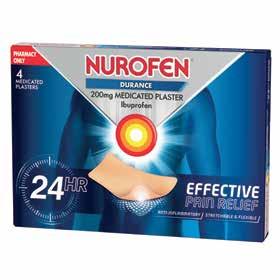
4 minute read
Children
SUPPLEMENTS FOR CHILDREN
Growing children, especially those who don’t eat a varied diet, sometimes don’t get enough vitamins A and C. It can also be difficult to get enough vitamin D through food alone for them.
That is why it’s important pharmacy teams are knowledgeable and educated about vitamin supplements and what advice to give to parents.
VITAMIN A
Vitamin A is important for babies and young children, and some may not be getting enough.
It strengthens their immune system, can help their vision in dim light, and keeps skin healthy.
Good sources of vitamin A include:
dairy products
fortified fat spreads
carrots, sweet potatoes, swede and mangoes
dark green vegetables, such as spinach, cabbage and broccoli
Vitamin supplements containing vitamins A and C are recommended for babies and children aged 6 months to 5 years old, unless they’re getting more than 500ml (about a pint) of infant formula a day.
VITAMIN C
Vitamin C is important for children’s general health and immune system. It can also help their body absorb iron.
Good sources of vitamin C include:
oranges
kiwi fruit
strawberries
broccoli
tomatoes
peppers
Multivitamins are often sought by new parents to ensure that baby has all the nutrients they need for the best start, no matter if breast or bottle fed.
VITAMIN D
The health promotion message really is hitting home with parents that this is an essential part of a new baby regimen. Calcium is the essential building block of bones and teeth. The more bone a child builds now, the more reserves they will have when bone loss begins in later years.
Foods That Have It: Dairy products, fortified foods, salmon, and dark green leafy vegetables such as kale.
Fibre isn’t a vitamin or mineral, but foods that are high in fibre also tend to be packed with many important nutrients, like vitamin E, vitamin C, calcium, magnesium, and potassium.
Even though most children who eat a healthy diet won’t need vitamins, specific circumstances may warrant supplementation.
Certain vitamin and mineral supplements may be necessary for kids who are at risk of deficiencies, such as those who:
follow a vegetarian or vegan diet
have a condition that affects the absorption of or increases the need for nutrients, such as coeliac disease, cancer, cystic fibrosis, or inflammatory bowel disease (IBD)
have had a surgery that impacts the intestines or stomach
are extremely picky eaters and struggle to eat a variety of foods
With respect to healthy lifestyle advice, pharmacy colleagues who are parents can empathise that we’re all aware of the healthy eating advice that can be followed for children. However, the worry that goes along with making sure they eat something, even if it’s not the “right” thing is very stark for any parent and so it is important to offer this advice in a non-judgemental way. This is where continued relationship building with patients that is the cornerstone of pharmacy practice becomes invaluable. Knowing that you have advice to give and really understanding your customer so that you know when and how to deliver it is key on this topic.
It’s important to focus on the evidence base and align advice with national guidelines, so make sure you and your team are aware of them. Checking with parents how they think things are going can help lead a conversation e.g.:
“How do you think your little one is doing in getting their 5 a day? It can be really hard, can’t it?”
“With all the advice that is around, it can be hard to choose the right foods to give a balanced diet - will we check what is recommended for your child and look at some appropriate supplements?”
“If you’d like to check what’s considered a healthy and normal weight for the age of your little one, we can help you find out. We can even help take the measurements if you’d like.”
For specific scenarios like when vegetarian parents make a choice for their child to eat a vegetarian diet, the job of the pharmacy is to highlight potential deficiencies that may arise, but more importantly offer solutions to support parents. Signposting details for Nutritionists and Dieticians should be available to the team to refer for extra care if needed.
Pharmacy and pharmacists still remain one of the most accessible healthcare professionals and first ports of call for queries from patients regarding infant and toddler feeding or supplements. Having a reliable range to recommend from is invaluable to ensure that your advice is acted on and even inspires the next visit to the pharmacy for any other queries at each life stage of children.













